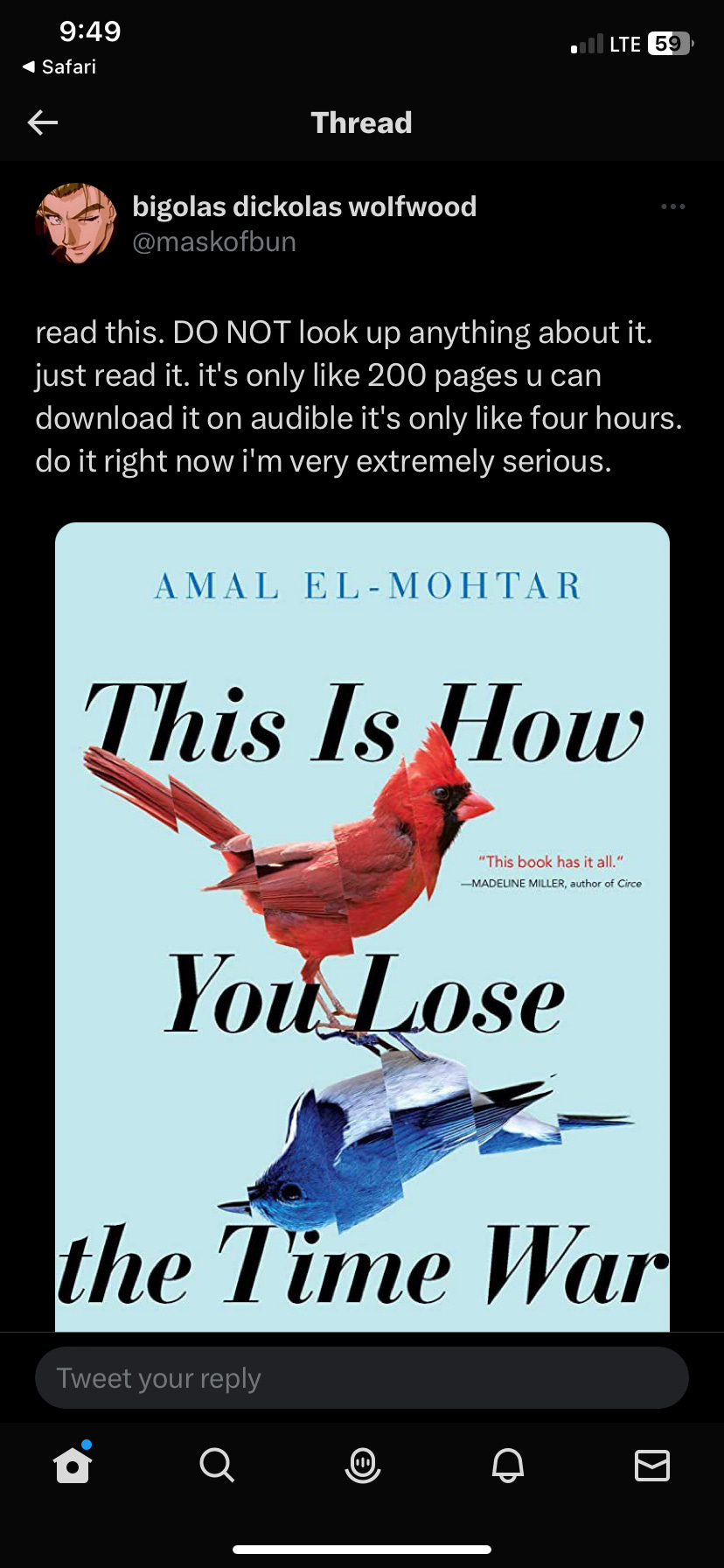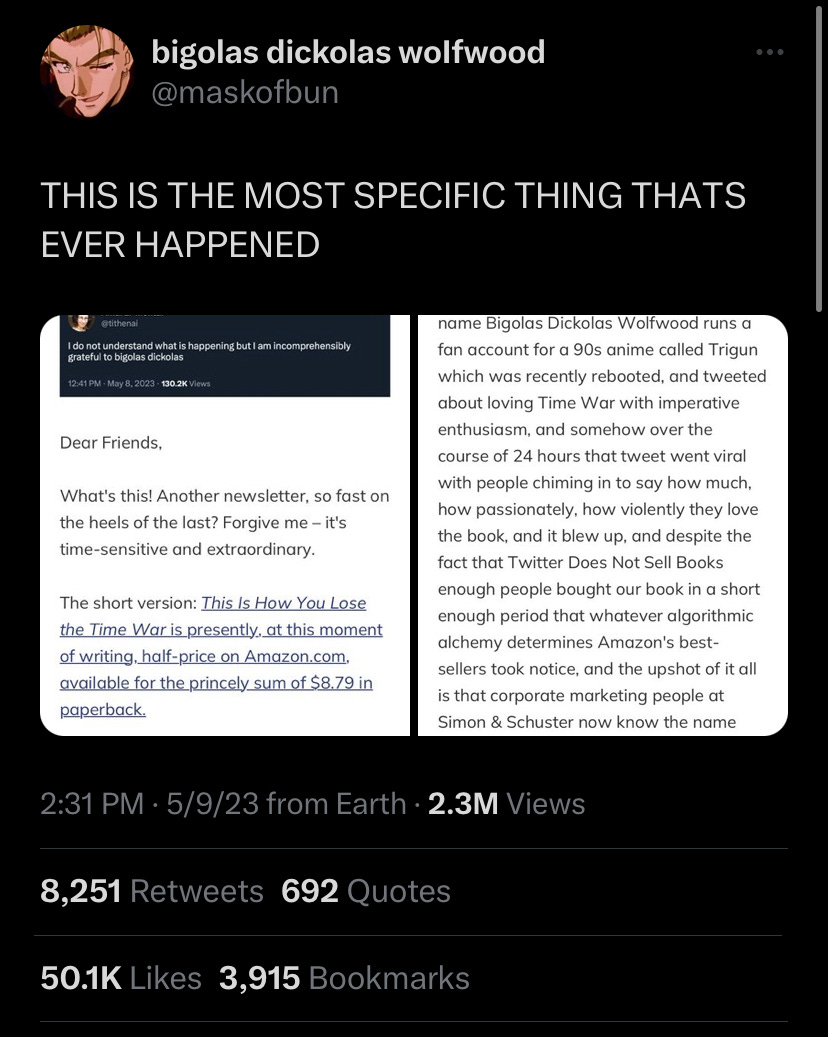People forget that books are a slow game. A book both is and isn’t a product; an author both is and isn’t a brand. There were a few situations that came up in the past few weeks which demonstrated that the long game of publishing is stranger, more fraught, and occasionally more rewarding than the short-sighted, splash-chasing people in charge would prefer. I’d like to talk about the funniest one.
On May 7, a Twitter user with a username unprintable in most family newspapers, tweeted about the 2019 novella This Is How You Lose the TIme War by Amal El-Mohtar and Max Gladstone. The Twitter user— I’m sorry, I have to give their username, it was Bigolas Dickolas Wolfwood— tweets primarily about the anime Trigun, and as far as I know didn’t have a crazy number of followers before this. The tweet inexplicably went viral; thousands of people bought the book; some powers-that-be somewhere said hey, let’s put it on sale for half price, and then the thing hit the New York Times bestseller list.
It was surreal. And a bit odd. Certainly thrilling for the two authors, who will see nice royalty checks off of this. But it’s not like This Is How You Lose the Time War was some unknown, under-the-radar sleeper hit. It was nominated for awards and made several end-of-year best-of lists. It had ten thousand reviews on Amazon before all this happened. And yet! And yet, here we are, with This Is How You Lose the Time War at #6 on the bestseller list, five years after its release.
Publishing chases this kind of virality like nothing else. An overnight sensation like this is the wet dream of every editorial director drooling with envy over Colleen Hoover’s inexplicable (to me) surge in popularity and every agent horny for the high-six-figure advance for a debut. But as Bigolas Dickolas has proven, you can’t manufacture virality in an authentic way, a way that appeals to readers. It has to happen on its own. The chaos emeralds or whatever have to align in just the right combination of book, timing, author, and origin; whatever kismet sparks has to feel like something the reader is in on, rather than something they’re spoon-fed and expected to lap up.
Bigolas Dickolas Wolfwood themselves (I don’t know their pronouns) seemed a little bewildered by the whole thing. S&S’ marketing department now knows who they are and is following them. And I think we’re starting to really see book publicity’s failings: increasingly, the plan is to throw a book out in the world and see if a Bigolas Dickolas comes along. In one of my group chats, a friend said that one of their books’ “Marketing plan” came through and the plan was essentially to hope for virality. Pals: that’s not a plan. That’s barely even a scheme.
As a Gizmodo article put it:
“What really sells books? Word of mouth. And what is word of mouth? It’s this. It’s someone shaking you by the shoulders and saying “This book just ruined my life, you have to read it!” It’s your friend shoving a copy into your hands and saying, “Just text me when you reach chapter seven.” It’s hearing from someone who doesn’t just recommend the book, but has taken it upon themselves to convince as many people on earth to read it as humanly possible.”
If you thought I was going to present solutions here, suggestions of what publishers should be doing, I am sorry to disappoint you. Except to say: this is a long game. Things will happen that surprise you. And if you have a book that you love as much as Bigolas Dickolas loves Time War, tell people about it. Be the Bigolas Dickolas you want to see in the world.
WHAT I’M READING
I’m working my way through Last Call at the Hotel Imperial which continues to be fabulous. The author has drawn on a wealth of archival material and interviews with the family of the people she is writing about, and it’s fascinating to read about this aspect of the interwar period. Much of my reading has focused on political or military figures or fiction writers— it feels stupid to say but I hadn’t really given a great deal of thought to the journalistic point of view to the interwar period. At least not to the personalities of those making the news. It’s an engrossing and engaging book and I find myself drawing it out!
HOUSEKEEPING
Please forgive any typos- I am finishing this up on my phone on a bus to western Massachusetts, where I’m going to be attending my 15 year college reunion this weekend. I know, what my excuse every other week? Substack doesn’t have a way to compose a real newsletter in the app, so for various phone browser related reasons I’m going to have to add links in post, as it were.
My first novel, Marrying In, is available for purchase on Kindle, Nook, and Kobo, and is coming soon to iBooks. If you’ve read it, consider leaving a review—that helps me and the book in the long run!
I’m available to hire for freelance editing services on Reedsy. You can find me on social media on Twitter, Instagram, and now TikTok. If you buy any of the books linked in this newsletter I receive a small commission at no cost to you.
THIS WEEK IN HOCKEY
The Florida Panthers, a team whose existence I have forgotten at various points in my hockey journey, swept the Carolina Hurricanes in four games, earning them a spot in the Stanley Cup Final. As for who they’ll be playing, I am sad to say it’s not looking great for the Stars. They trail the Vegas Golden Knights by two games, so they have to win the next three to make it— and if they do, they’ll be up against the Panthers, who will be significantly better rested going into the final. Still, it’s been an exciting playoffs run. I wish there were a way to watch the games more easily!






Oh, the Canes were in the playoffs?
*wanders away in obliviousness to area sports*